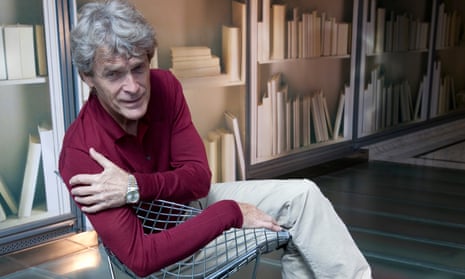One of the advertising world’s most celebrated contrarians, Sir John Hegarty is still railing against conformity after more than 50 years at the forefront of the industry. The co-founder of ad agency BBH and creator of acclaimed campaigns for brands such as Levi’s, Audi, BA and Johnnie Walker, Hegarty believes that the propensity for groupthink in the modern workplace can kill off creativity.
“No great idea has ever come out of a brainstorm meeting,” Hegarty says. The trouble with brainstorms, he believes, is that they operate at “the speed of the slowest person in the room”. “Einstein didn’t work in a brainstorm session,” he adds. He sees parallels between brainstorming and communism. “Germany got the BMW, while East Germany got brainstorm sessions and the Trabant. Who wants a fucking Trabant?”
Hegarty, who runs a startup incubator the The Garage Soho, was speaking at an event hosted by the Guardian Small Business Network at Soho Works, a co-working space in Shoreditch, London.
As guest speaker at the event he explained his approach to creativity – which he defines as “an expression of self”. He told the audience: “I don’t care if you’re designing packs for Tesco or you’re making a movie, what you do, your creativity, is an expression of you.”
Hegarty has made a career out of challenging conventions. His first ad campaign for Levi’s, launched in 1982 the year he co-founded BBH, showed a black sheep among a herd of white sheep moving in the other direction with the tagline “when the world zigs, zag” – words which went on to become the agency’s mantra. Hegarty was behind Levi’s most famous TV ads, including commercials featuring model Nick Kamen and the head-banging yellow puppet Flat Eric.
His advice to anyone wanting a long and successful creative career is to pay more attention to the world around them. “If you’re a creative person, remove the headphones,” he says. “You’re listening to the latest tracks as you walk down the road and think you look cool ... All these ideas are coming into you all the time, if you cut yourself off you are reducing and limiting your ability to survive.”
Spending your time staring at a screen won’t help either. “Everybody else is looking at a computer screen,” he says. “You’ve got to do things other people aren’t doing.” Hegarty is also not a fan of the beanbag chairs that are often a feature of workspaces in the creative industries. “The last place anybody is going to have an idea is sitting on a beanbag. You’ll fall asleep on a beanbag.”
He warns that cynicism will crush creative ambition, saying that everyone, from novelists to fashion designers, needs to believe in what they are doing. “Great creative people are optimists,” he says.
Another way to prolong your career is to surround yourself with people who are unafraid to disagree with you, no matter how successful you get. “You become distanced from the people you can really count on because that is what success does,” he says. Hegarty calls this “McCartney syndrome”. “Paul McCartney wrote some of the greatest songs. Then he breaks up with John Lennon and ends up writing the fucking frog song. He didn’t have Lennon saying to him ‘Hey Paul ... that’s shite’.”
After running BBH for over 30 years, Hegarty has turned his attention to the next generation of entrepreneurs with the incubator for seed stage companies he co-founded alongside venture capitalist Tom Teichman in 2014. The startups backed by The Garage include the online mattress retailer Simba and property technology business Settled.
Hegarty says he and his team look for startups that disrupt a current model and offer a product or service that makes life easier. “There are core principles if you’re thinking of setting up a business. Is it going to disrupt a current market, is it scalable and is it monetisable?,” he says. “I can’t tell you the number of people who come to us with a great idea and we ask them how do you make money out of that, and they don’t know.”
The Garage’s motto is “don’t start a business, build a brand”. He explains: “It doesn’t matter how great your idea is or how brilliant the technology, within no time at all somebody will have copied it ... What you’ve got to do is build an interesting brand because a brand will protect you from competitive pressure.”
In his talk, Hegarty championed the importance of the idea and its power to change the world, saying: “Anybody can have an idea, you don’t need special equipment or special training or special permission, unless you live in North Korea.”
Answering an audience member’s question on the challenges facing traditional advertising agencies in the digital age, he said: “I hear people in advertising saying there’s no point because nobody’s watching ads any more – that’s just stupid.
“Architects haven’t gone ‘Jesus, it’s too difficult to put up interesting buildings any more so let’s give up’ ... The application of creativity is the solution to all of these problems.”
Sign up to become a member of the Guardian Small Business Network here for more advice, insight and best practice direct to your inbox.

Comments (…)
Sign in or create your Guardian account to join the discussion